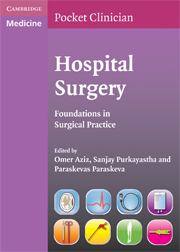Book contents
- Frontmatter
- Contents
- List of contributors
- Foreword by Professor Lord Ara Darzi KBE
- Preface
- Section 1 Perioperative care
- Section 2 Surgical emergencies
- Section 3 Surgical disease
- Hernias
- Dysphagia: gastro-oesophageal reflux disease (GORD)
- Dysphagia: oesophageal neoplasia
- Dysphagia: oesophageal dysmotility syndromes
- Gastric disease: peptic ulcer disease (PUD)
- Gastric disease: gastric neoplasia
- Hepatobiliary disease: jaundice
- Hepatobiliary disease: gallstones and biliary colic
- Hepatobiliary disease: pancreatic cancer
- Hepatobiliary disease: liver tumours
- The spleen
- Inflammatory bowel disease: Crohn's disease
- Inflammatory bowel disease: ulcerative colitis
- Inflammatory bowel disease: infective colitis
- Inflammatory bowel disease: non-infective colitis
- Colorectal disease: colorectal cancer
- Colorectal disease: colonic diverticular disease
- Perianal: haemorrhoids
- Perianal: anorectal abscesses and fistula in ano
- Perianal: pilonidal sinus and hidradenitis suppurativa
- Perianal: anal fissure
- Chronic limb ischaemia
- Abdominal aortic aneurysms
- Diabetic foot
- Carotid disease
- Raynaud's syndrome
- Varicose veins
- General aspects of breast disease
- Benign breast disease
- Breast cancer
- The thyroid gland
- Parathyroid
- Adrenal pathology
- Multiple endocrine neoplasia (MEN)
- Obstructive urological symptoms
- Testicular lumps and swellings
- Haematuria
- Brain tumours
- Hydrocephalus
- Spinal cord injury
- Superficial swellings and skin lesions
- Section 4 Surgical oncology
- Section 5 Practical procedures, investigations and operations
- Section 6 Radiology
- Section 7 Clinical examination
- Appendices
- Index
Colorectal disease: colonic diverticular disease
Published online by Cambridge University Press: 06 July 2010
- Frontmatter
- Contents
- List of contributors
- Foreword by Professor Lord Ara Darzi KBE
- Preface
- Section 1 Perioperative care
- Section 2 Surgical emergencies
- Section 3 Surgical disease
- Hernias
- Dysphagia: gastro-oesophageal reflux disease (GORD)
- Dysphagia: oesophageal neoplasia
- Dysphagia: oesophageal dysmotility syndromes
- Gastric disease: peptic ulcer disease (PUD)
- Gastric disease: gastric neoplasia
- Hepatobiliary disease: jaundice
- Hepatobiliary disease: gallstones and biliary colic
- Hepatobiliary disease: pancreatic cancer
- Hepatobiliary disease: liver tumours
- The spleen
- Inflammatory bowel disease: Crohn's disease
- Inflammatory bowel disease: ulcerative colitis
- Inflammatory bowel disease: infective colitis
- Inflammatory bowel disease: non-infective colitis
- Colorectal disease: colorectal cancer
- Colorectal disease: colonic diverticular disease
- Perianal: haemorrhoids
- Perianal: anorectal abscesses and fistula in ano
- Perianal: pilonidal sinus and hidradenitis suppurativa
- Perianal: anal fissure
- Chronic limb ischaemia
- Abdominal aortic aneurysms
- Diabetic foot
- Carotid disease
- Raynaud's syndrome
- Varicose veins
- General aspects of breast disease
- Benign breast disease
- Breast cancer
- The thyroid gland
- Parathyroid
- Adrenal pathology
- Multiple endocrine neoplasia (MEN)
- Obstructive urological symptoms
- Testicular lumps and swellings
- Haematuria
- Brain tumours
- Hydrocephalus
- Spinal cord injury
- Superficial swellings and skin lesions
- Section 4 Surgical oncology
- Section 5 Practical procedures, investigations and operations
- Section 6 Radiology
- Section 7 Clinical examination
- Appendices
- Index
Summary
Introduction: Diverticular disease is one of the commonest surgical conditions affecting theWesternWorld, and the burden of this disease is therefore increasing with the rising numbers in the elderly population. In most patients it remains asymptomatic but its potential complications have a high morbidity and mortality rate.
Definition and classification
A false pulsion diverticulum. Large bowel mucosa is forced through the muscularis propria where it is pierced by the vasa recta (Figure 93). Diverticulosis implies asymptomatic disease whereas diverticulitis is symptomatic. Diverticular disease can be classified as acute or chronic and complicated or uncomplicated.
Incidence
Diverticulosis affects about 50% of 60-year-olds. Increased incidence with age. F > M. It is predominantly a disease of the western World, probably related to dietary factors (but low incidence in western vegetarians).
Aetiology
This is predominantly an acquired disease. Commonest in the sigmoid colon. Its principle causes are thought to be a raised intraluminal pressure secondary to a poor diet causing bulky stools and colonic segmentation: tonic and rhythmic contractions result in non-propulsive contractions, producing isolated segments with high intraluminal pressure. A prolonged colonic transit time is also responsible.
Pathology
Macro: usually multiple and most frequent in sigmoid colon, right-sided diverticula are rare, and are usually seen in young Asian populations. Often associated with colonic structural changes e.g. elastosis of taenia coli, muscular hypertrophy, mucosal folding. Diverticula can cause (1) Fistulae: to bladder/vagina/small bowel/skin. (2) Perforation: 4/100 000 people with diverticular disease; 2000 cases/year. Most common at first presentation. (3) Abscess formation: pericolic or peritonitis.
- Type
- Chapter
- Information
- Hospital SurgeryFoundations in Surgical Practice, pp. 429 - 434Publisher: Cambridge University PressPrint publication year: 2009



